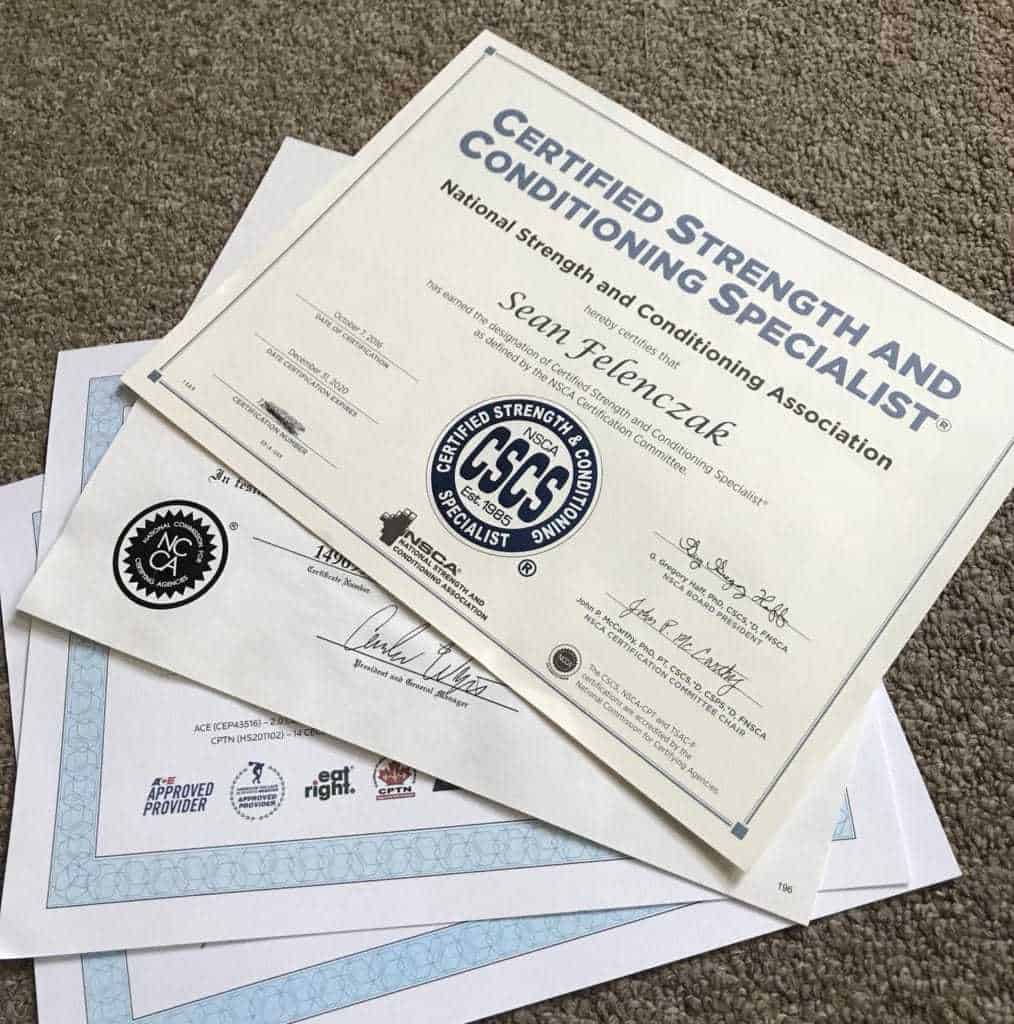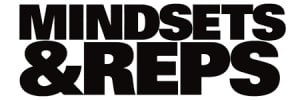
The question I get most from aspiring personal trainers is: what certification should I go for?
As long as it’s a nationally accredited certification, it doesn’t matter what certification you get. No one is going to hire you because you specifically have NASM, NSCA, ACE, ACSM, etc. Once you reach a certain threshold, all certifications are on the same level. No one particular certification is valued over the others.
What Job Do You Want
If there is a specific job you’re going after at a gym or fitness center, simply look for a job posting on a site like Indeed or LinkedIn and see what their certification standards are. From my experience, these listings will say something along the lines of “Any NCCA Accredited Personal Training Certification.” Then they will list various certification examples similar to the ones shown above.
What if the job you want is self employment? Then it REALLY doesn’t matter. Do you think a potential client is going to ask what certification you have? They don’t know the difference between NASM and ACE. All they want is for you to deliver a service that gets them to where they want to be physically.
Even if you’re renting a studio, the owner isn’t going to care which certification you have. They may require you to have personal trainer insurance, but that’s completely different from certifications.
Most Informative Certification
By now you’re thinking; I understand that all these certifications are equal when it comes to reputation, but surely one provides better knowledge overall? Well, not really. Think about what you learn from a personal training textbook. A little biology, anatomy and physiology, exercise technique, programming, and maybe some nutrition. Aside from programming, these are all science-based topics. Science is science. You’re not going to learn different cellular biology from one textbook compared to another.
The difference among all of these personal training governing bodies will likely be related to exercise programming and selection. I remember when I studied for my NASM certification that they had a very specific OPT model of programming. It was pretty weird because it involved a lot of bosu ball stuff which I didn’t agree with. It is what it is though. Sometimes you have to bite your tongue and just answer your test questions the way THEY would want you to.
I find that fitness professionals get too “certification happy”; studying for one certification then immediately moving on to a new one once they receive it. The thought process with this is that the more certifications one has, the more opportunities will come their way. But in reality, most of these extra curricular certifications won’t put you in a better position to succeed professionally. I just can’t imagine a situation where even a niche job would require one to have a corrective exercise or golf fitness certification.
The funny thing is that I think it’s a great idea to specialize in a certain client demographic. But again, an aspiring PGA tour golfer is never going to say “I’d love to work with you, but you don’t have the NASM golf fitness cert so I’m going to have to pass.”
It’s important to continue learning throughout your personal training journey. However, the magnitude of free resources on the internet makes it so you don’t have to drop $500 on an extra certification that will really get you nowhere.
Best Certification Among The Bunch
The NSCA offers a certification that is very highly regarded within the health and fitness industry called the CSCS (Certified Strength and Conditioning Specialist). The CSCS allows an individual to properly structure training programs for college and professional athletes. In addition, it would allow the person to teach exercise technique and go through all the normal tasks that come with working with athletes in person. It would cover all your bases for personal training as well even though it isn’t considered a personal training certification.
Personally, I didn’t realize how highly regarded the CSCS certification was until I saw some people with PhD’s and Masters Degrees putting the CSCS moniker next to their names. Obviously it’s not on the level of a graduate degree but it says a lot about the certification itself.
The strange thing is that most college and professional teams require both the CSCS and an exercise science degree. So if you were a person with a CSCS certification but did not go to school for exercise science, you would almost have to work independently with athletes to put it to use.
This exam is split up into two parts, and you have to pass both in order to receive the certification. It’s a challenging test but certainly doable. One of my most popular YouTube videos explains how I studied to pass with an 80 and an 87 the very first time. A word of caution, it’s been a few years since I took the test so I don’t know if anything has changed since then.
What Makes a Good Trainer
It’s not a piece of paper hanging on your wall. As mentioned earlier, your clientele don’t care what certification you have. Being a good trainer requires skills that go far beyond the textbook. Think about it this way: was your best coach necessarily the most tactical? Probably not, it was the one who was able to motivate you and put you in a position to succeed.
Are you able to motivate your clients? Do you communicate easily with people? I don’t necessarily mean being outgoing or extroverted. But, you may be training people that have never set foot in a gym before. Or you may be training people that are extremely overweight and self conscious. It’s your responsibility to make them feel comfortable and stay focused, not to tell them about the cytoplasm and mitochondria of muscle cells.
It’s ironic in a way. The personal training textbook goes into massive detail about levers, arteries, and foot dorsiflexion, but the people you’ll be using the training certification for couldn’t care less about that. You’ll be hard pressed to find a chapter that talks about connecting with people, motivation, or sustainability.
Are you able to sell? We all chose this job because we want to help people, but we still have to keep the lights on. Selling is different now, in a good way. No longer do you have to cold approach or cold call people. If you’re savvy with internet marketing you can run Facebook ads or simply drive traffic to your website. Of course you still have to close the deal in the end, but it’s much easier when you have people whom you already know are at least interested in your service.
Certification Process
If you’ve decided to become a personal trainer, odds are you already work out. Don’t stress out over getting certified. It’s just one step in a long process to success. I’ll go as far to say that you won’t learn much from the certification textbook that’s actually going to translate to one-on-one personal training. The things that I have learned and implemented with clients are from my own experience and research.
Also, if you screw up and fail the test the first time, don’t get hung up on that. It doesn’t mean you can’t be a good trainer or that personal training just isn’t for you. It means you failed a science/vocabulary test. No client will ever say “I lost so much weight and he was so helpful, but he didn’t know the difference between the transverse plane and sagittal plane so he was a bad trainer.”
99% of your time in this introductory process to personal training should be thinking about where you want to take your career, not stressing over which piece of paper to get.
Recent Posts
Stretching Before Workouts: Essential Warmup or Performance Killer
“Don’t stretch before workouts, your muscles become too supple” “Stretch before your workouts, warming up is important” It's conflicting advice like this that drives people crazy,...
Best Protein Bar For the Money | Cost Effective, High Quality
Protein bars are no longer a supplement dedicated to diehard gym rats, with awful taste and the consistency of a brick. Men, women, and even teenagers can commonly be seen eating protein bars. The...
